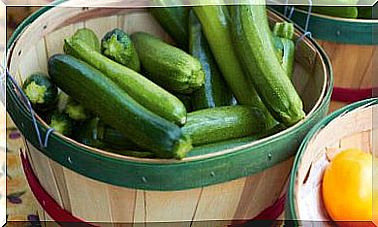Chamomile And Other Remedies For Digestion
Alternative medicine recommends the consumption of infusions to relieve stomach upset. What are the best hot drinks for this purpose?

Stomach pain, constipation, intestinal irritation… these are just some of the most common digestive disorders. Some herbs, such as chamomile, are considered remedies for digestion, as they would have properties that would help relieve symptoms.
If you sporadically suffer from any of these discomforts, you could try drinking one of the infusions that we will present below. However, in the case of persistent pain, it is best to see a doctor for timely diagnosis and treatment.
Digestive disorders
The National Institute of Diabetes and Digestive and Kidney Diseases points out that the digestion process is very important since, through it, the body obtains nutrients from food.
In fact, digestion is the process by which food is broken down into simple molecules that can be used by the body’s tissues for their proper functioning and, also, to produce metabolic energy.
The organs of the digestive system
To understand the importance of digestion, it is worth discovering which organs are involved in this process and what functions they carry out. These are the following:
- Mouth: is where the grinding and salivation of food occurs. There, its chemical breakdown begins, mainly that of carbohydrates.
- Pharynx: This membranous muscle is located in the neck and connects the mouth and nostrils with the esophagus and larynx. It allows air and food to pass through a valve called the epiglottis.
- Esophagus: is a tube that connects the pharynx with the stomach. Its muscular walls contract and relax downward to allow the bolus to pass through. It is very delicate and can be damaged by the reflux of stomach acids.
- Stomach: this muscular bag is responsible for storing and processing ingested food. It is made up of cells that secrete acids and enzymes that allow the metabolization of lipids and proteins, among other substances.
- Small intestine: it is about 20 feet long and is located next to the stomach. It receives secretions from the pancreas and other glands whose enzymes finish transforming food into simple molecules, such as amino acids. It is made up of the duodenum, jejunum, and ileum, where nutrient absorption also occurs.
- Large intestine: it measures about one and a half meters and includes the colon and rectum. It ends in the anus, through which the remains of digestion are discharged in the form of feces. It is essential for the absorption of vitamin K, fiber and water.
Main digestive conditions
Each of these organs can be affected when eating habits or lifestyle are not healthy. Eating unbalanced or spoiled meals, consuming drugs and / or alcohol, using certain medications and even stress are causes of the most varied disorders.
Among the most common are indigestion, constipation and diarrhea, but you can suffer from different chronic diseases. Faced with the presence of these symptoms, it is possible to drink infusions that could alleviate them.
Natural remedies to improve digestion
Although there are herbal teas and other preparations that have been used for many years and are usually advised by grandmothers to alleviate digestive discomforts, it is always advisable to go to the doctor in the presence of persistent discomforts. Now, if the discomfort is mild, you can try drinking one of the following infusions.
1. Chamomile infusion
Chamomile is known as “the digestive plant par excellence.” But what is true in this nickname? Traditionally, the belief has passed from generation to generation that chamomile would help improve digestion, relieve gastric ulcers and prevent reflux.
An extensive study titled Chamomile: A herbal medicine of the past with bright future looked at all existing research on chamomile up to 2010 and found that:
- It would alleviate colic in newborns : The researchers evaluated the response of newborn babies to an extract made from chamomile and other herbs and found a reduction in colic in 57% of the cases.
- It would cut the diarrhea: the diarrhea of the children who ingested chamomile ended earlier than in the case of the group that took the placebo.
- It would fight heartburn in a similar way to a commercial antacid.
- It would have an antiulcerogenic effect.
- It would dissipate gas, calm the stomach, and relax the muscles that move food in the intestines.
How to prepare it?
If you want to prepare this infusion, you only need to heat 1 cup of water and, when it breaks the boil, add 2 grams of chamomile leaves or flowers. Let stand 5 minutes, well covered. Drink it warm after every meal.
2. Cinnamon infusion
Cinnamon is used in gastronomy and pastries due to its wonderful aroma and flavor. In addition, natural medicine considers it a tonic that could alleviate different ailments.
A publication from Pharmacognosy Research concluded that cinnamon has antioxidant effects that fight free radicals and prevent oxidative damage, as well as anti-inflammatory properties.
It is believed, according to its traditional use, that it would serve to alleviate flatulence problems, nausea and diarrhea. However, there is no conclusive data in this regard. It is often suggested that people who are nervous or suffering from ulcers avoid consuming this infusion, as it would stimulate the secretion of gastric juices.
How to prepare it?
Boil water in a saucepan, then add 1 cinnamon stick. Let stand about 10 minutes, strain and drink. If you wish, you can add a teaspoon of honey to sweeten your infusion.
3. Star anise infusion
Star anise, or Chinese anise, resembles anise in its flavor, but is obtained from the pericarp of Illicium verum . This plant is a perennial tree native to China whose properties would be beneficial for the digestive system. For example, scientists have found that it would stimulate the appetite.
This spice contains anethole, an aromatic compound that, according to data from Scripta Scientifica Pharmaceutica , would relieve an upset stomach and nausea, as well as fight bloating and gas. Likewise, star anise would have sedative, antibiotic, antibacterial and antiparasitic properties.
How to prepare it?
Heat 1 liter of water and when it boils, add 30 grams of anise. Let it cool. You can drink a cup every time you need it. The specialized website E-Lactancia does not recommend its intake by pregnant and / or lactating women, and young children.
4. Infusion of lemon balm
The Melissa officinalis , more popularly known as lemon balm, lemon balm or lemon balm is a plant used since ancient times as a digestive. Contains terpenes, citronellol, citral and geraniol, active ingredients that give it its citrus flavor and sedative properties.
Although its most widespread use by experts in natural medicine is to calm disorders related to stress and anxiety, there is scientific data that support its antispasmodic properties. In addition, it is believed that it could help improve colitis, heartburn and flatulence.
How to prepare it?
To prepare a cup of this infusion, you need 3 tablespoons of dried lemon balm leaves. If you are using fresh leaves, you will need 3 to 9 grams. Heat a glass of water and when it boils, add the leaves. Let them infuse for about 10 minutes.
Consult your doctor if the discomfort persists
If despite ingesting any of these infusions, the stomach upset persists for more than two days, do not hesitate and go to your trusted doctor for an examination.
Finally, keep in mind that good digestion helps you have a good day. Changing your eating habits and leading an active lifestyle will promote intestinal motility and, therefore, digestion.









